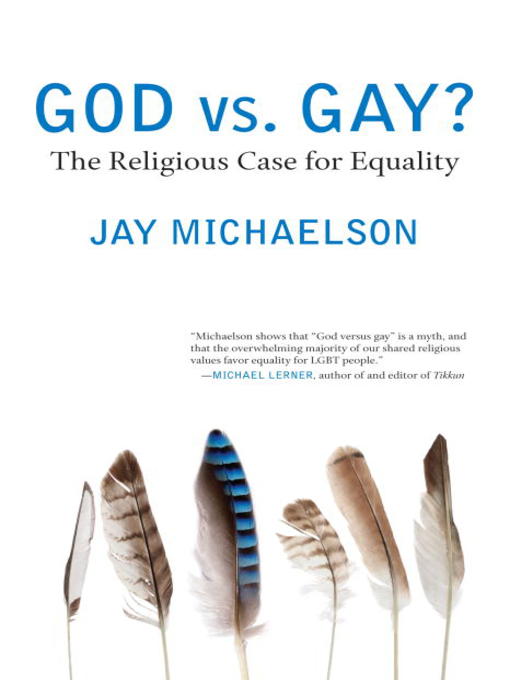
God vs. Gay?
The Religious Case for Equality
- اطلاعات
- نقد و بررسی
- دیدگاه کاربران
نقد و بررسی

August 8, 2011
Michaelson, biblical scholar and founder of the Jewish GLBT organization Nehirim, makes the case that God-versus-gay is a lie. Not only is there no conflict between being gay and being religious, but also the core values of Judaism and Christianity demand that GLBT individuals be respected and welcomed. In the first and last thirds of the work, Michaelson explores those core values and anticipates the benefits of making religion less hostile to homosexuality. While well-reasoned, added depth and length would make his claims more persuasive. The central third of his book shows why the biblical verses commonly used to attack homosexuality should not be understood that way. Although this material has been more convincingly presented elsewhere, having it alongside the other two parts of the work underscores why gay-friendly scripture readings should be more compelling. The audience for the book remains unclear; sometimes Michaelson addresses GLBT individuals, sometimes allies, and sometimes opponents of legal equality. This scattering keeps the book from providing much concrete advice. As a salvo in the case for equality, however, it shows how to reframe the debate and stop seeing a chasm between God and gay.

September 15, 2011
A progressive look at homosexuality in religion told from a Jewish perspective.
LGBT activist Michaelson is openly gay and also Jewish, two traits he does not define as mutually exclusive. Religion taught him to live with integrity but then decried him for doing so; since his sexual orientation was a violation of Jewish law, the author felt obligated to lie to his loved ones and resign himself to meaningless affairs. Mixing memoir and academic analysis in this well-researched and concisely written treatise, Michaelson embarks on a mission to reconcile sexuality with Judeo-Christian religious traditions. He begins, appropriately enough, with Adam and Eve, explaining how loving relationships between straight and gay couples alike are fundamental to a religious lifestyle. From a scientific perspective, sexual diversity is both natural and beneficial to our species, a point Michaelson argues with examples from the animal kingdom as well as our own. Ultimately, the author feels that welcoming lesbians and gays into religious communities will create family values rather than destroy them, which he best encapsulates with a lively attack on "reform" camps that claim to cure homosexuality. But he also dissects the more troubling passages in Leviticus and Romans, deftly unraveling common mistranslations of the text and placing the scripture in historical context. No religious debate on homosexuality can ignore the infamous story of Sodom and Gomorrah. For this, Michaelson draws from both Jewish and Christian history to explain how the passage came to be associated with homosexuality before he offers his alternative view.
Inclusive and modern theology that will give both Jewish and Christian readers a reason to celebrate sexual diversity.
(COPYRIGHT (2011) KIRKUS REVIEWS/NIELSEN BUSINESS MEDIA, INC. ALL RIGHTS RESERVED.)

August 1, 2011
Those who oppose equal rights for LGBT people are often Christians who assert that the Bible is God's literal word and that several passages in it condemn homosexual activity. Even Christians who aren't Bible literalists agree that both the Bible and church traditions see homosexual activity as sinful. Here Michaelson (God in Your Body: Kabbalah, Mindfulness and Embodied Spiritual Practice), an LGBT activist who works in the fields of religion, sexuality, and law, claims both that the Bible doesn't condemn homosexuality and that the traditions of the churches generally don't condemn it either. His is not a closely reasoned scholarly presentation but rather a popular approach to the questions, "What does Scripture really say about homosexuality?" and "What do 3000 years of Judeo-Christian history really say?" He argues convincingly that the few Old Testament passages that seem to condemn homosexuality aren't actually referring to it at all, that our translations/interpretations are in error. For example, the Hebrew word toevah, usually translated as "abomination," really means something like "taboo" and intends the sense of violation of true worship, an instance neither of moral nor of social failure but of idolatry. VERDICT This title is very much worth reading and particularly useful for those interested in religion, civil rights, and social progress.--James F. DeRoche, Alexandria, VA
Copyright 2011 Library Journal, LLC Used with permission.

October 1, 2011
Core values of Judaism and Christianity alike oblige believers to support gay rights, Michaelson says. Bear that in mind, he asks, throughout the three parts of his literate, broadly informed argument. In the first part, he explains how and why gay equality is the positive outcome of upholding and practicing love, compassion, honesty, integrity, and justice. In the second, he takes on the seven notorious Bible verses used to bash gays and, drawing on historical, linguistic, and archaeological research as well as biblical context, contends that they either don't refer to homosexuality (the Sodom and Gomorrah story) or warn against the practices of non-Jewish, non-Christian religions. In the last part, he argues that gay inclusion will enrich families, congregations, and larger religious communities and further the growth of religious values. The labors of the second and third parts have been well done by others, but the first part's insistence that Judeo-Christian values require gay equality is so confidently and cogently asserted that it amounts to something new and invigorating in gay religious apologetics.(Reprinted with permission of Booklist, copyright 2011, American Library Association.)




دیدگاه کاربران